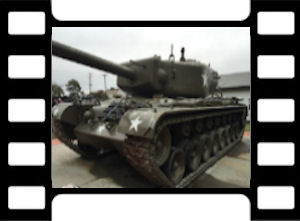War has been a dangerous business since the dawn of humankind. Given the number of times people have fought and killed each other for specific causes and the major issues that come before, during, and after battle, it's no wonder that true stories of war have existed for centuries. They have been documented in old writings as well as print, radio, television, and online news media in the modern era. And of course, when you're talking about the current age of information and technology, you cannot ignore the Hollywood film industry that loves to produce movies based on true stories, which can include war movies.
If you love movies, chances are that there is at least one war film you always remember. What's interesting is that not all war movies are the same, given the various aspects of war that one can focus on. Some will sadden you because of lives that are lost. Others will scare you because of extreme violence that takes place in combat. Then there are those that even provide a bit of inspiration beyond the bloodshed. Whatever the film is, you can expect it to focus on a specific aspect of war and provide a unique perspective on it. Collectively, films of the war genre provide a broad picture of the widespread impacts that war has, both positive and negative.
Let's take a moment to reflect on war movies and what they can offer. Now, this is not a complete list of war films, nor is it a formal showcase of all landmark war films. This is simply a partial list of war movies reflecting the ones that I've seen and that have impacted me on some level. Hopefully, this can inspire you to look at the genre of war movies and to reflect on your own memorable experiences of watching them. More importantly, I hope the following commentary can remind you of the toll that war can take and the good that could still come out of it.
HEROISM
When you think of war, the first thing that might come to mind is that war is where heroes are born. You may be imagining a soldier who enters the heat of battle, survives the onslaught, and emerges victorious. Or if you think war isn't about the fighting itself but rather the ultimate objectives that are achieved afterwards, you might be picturing a uniformed officer who functions as a peacemaker as much as, if not more than, a fighter. While both types of images are interesting, I do sometimes find myself leaning towards the soldier with a peacemaker mentality.
One film that comes to mind is
Lawrence of Arabia. Now, I know what you're thinking. Is that really a war movie, or is it more of historical drama? Well, that is a valid question, and even I admit that Lawrence of Arabia isn't a war movie per se. However, I'm still bringing it up here because the title character of T.E. Lawrence, played by Peter O'Toole, is a British army officer during World War I who is sent to the Middle East to help the Arabs fight the Turks. That's enough for the movie to be part of the war genre, even if it's not 100% war.
Anyway, here's why I mention this film as an example of heroism in a war movie. The character of Lawrence is portrayed as a man who can fight while reminding us of the ultimate objective of peace. You have the battle sequence that takes place late in the film, showing his skill as a military leader. While you're at it, pay attention to the scenes featuring Lawrence in dialogue with various characters, and take note of the part where Lawrence puts aside his own journey across a desert to find one man lost in the same scorching landscape. It's a nice scene because of Lawrence's selflessness, not to mention the gorgeous desert cinematography and the sweeping musical score to go with the scene, all reminding us that this movie about a soldier is meant to be inspiring.
Lawrence eventually reaches a breaking point and ultimately leaves from military duty. But that doesn't matter. The important thing is that everything he manages to do shows the world how much of a hero he is.

HORROR
It's an undeniable fact that people die in war or survive with devastating trauma. It's no surprise that the majority of people around the world are disgusted or horrified by the negative consequences of war. After all, who would want to face the threat of death with zero margin of error? Even if you don't actually get onto the battlefield, the idea of it could still be very unsettling.
Now, I'm not going to highlight war movies that depict graphic war violence. There are a ton of those. Rather, I shall focus on movies that depict post-war scars, both physical and mental. For me, the one film that comes to mind is Michael Cimino's 1978 war drama epic
The Deer Hunter. It stars Robert De Niro, John Savage, and Christopher Walken as three friends in Pennsylvania whose lives change after they are thrust into the Vietnam War. The first act of the movie shows their daily lives, both on the job as steel workers and off the job hanging out with each other and going to a wedding. It's all pleasing to watch, but sadly, it ends there.
The war scenes are tough to watch, especially the part where the trio is forced by the Viet Cong to play Russian roulette. But the focus is not what happens in the war, but what happens after. The Robert De Niro character successfully returns home from the war, but he misses his two buddies. This prompts him to go out looking for them. That's when he sees John Savage with physical injuries at a veterans hospital. But the worst fate is seen with Christopher Walken, who has been traumatized by Russian roulette to the point where that's all he spends his time doing. It's miraculous that he could do so for so long without firing a bullet into his head. But will Robert De Niro save his friend in time?
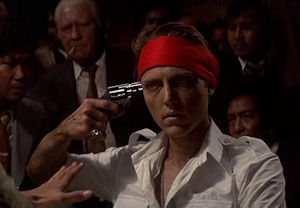
Here's one more example of a war movie with the theme of wartime horror. Francis Ford Coppola's
Apocalypse Now presents a lot of bloody combat during the Vietnam War. There's a helicopter raid sequence, an encounter with a merchant boat, and a nighttime battle scene. All of it leads the main character, played by Martin Sheen, to the mysterious and reclusive Colonel Kurtz, played by Marlon Brando. This is a man who is greatly disturbed by what he has seen. Ultimately, he utters his final words before his last breath: "The horror! The horror!" (Just like in Joseph Conrad's novella Heart of Darkness, which was the basis for this movie.)

Overall, films like The Deer Hunter and Apocalypse Now remind us that war has long-lasting consequences. It can destroy lives, mutilate the body, and traumatize the mind. It's not to say that heroism in war shouldn't be celebrated, but rather the horrors of war should not be forgotten for the sake of celebrating heroism. As we all know from history, war is bad news for everybody.
SACRIFICE
With the risk of death and injury, there can be situations where such a calamity is inevitable for one person. Often, a tough choice is made regarding which person will live or die or which person will suffer or not. In such situations, the right thing to do is to make sure the person whose life is more important is guaranteed safety while the other must take the fall. It's always sad for any soldier to go down in battle, but when it means a second chance for someone else, that is considered a heroic act of sacrifice.
Just look at the highly acclaimed war film
Saving Private Ryan. Tom Hanks is Captain Miller, who is asked to lead his unit on a search for the missing Private Ryan, played by Matt Damon. Obviously, this mission to save Private Ryan is not one that Miller voluntarily chooses to do, because it's an order from his military superiors. Still, when Miller does find Private Ryan and the two find themselves in a life-threatening combative situation, it becomes more important than ever for Miller to protect Ryan. I won't spoil what happens later, but let's just say that an act of sacrifice is beautifully done and incredibly moving.
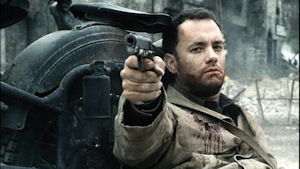
Sometimes a sacrifice involves the face of a war effort losing his life, but with his message still remaining strong. For this, the movie I shall cite as an example is not a film you would think of as a war movie, but rather a historical drama that has plenty of battle scenes. I'm talking about the 1995 film
Braveheart. If you think about it, you could call it a war film because it's about William Wallace's effort to free Scotland from the rule of a tyrannical English king, and Wallace has to lead a horde of Scots into battle against the English. Just because the movie is set in the Middle Ages doesn't mean it cannot be a war movie.
Anyway, the notion of sacrifice comes into play in Braveheart because Wallace ultimately faces death with no hope for escape. Even if he is killed, his death does not put an end to the Scots' quest for freedom. If anything, Wallace's death only keeps his memory alive, which keeps the fire burning. Ultimately, the Scots do succeed and earn their freedom. Wallace may not be alive to experience it himself, but his efforts have made it possible for many others beside him to enjoy the reward. That's what sacrifice is: giving up one's personal desires for the greater good of others.
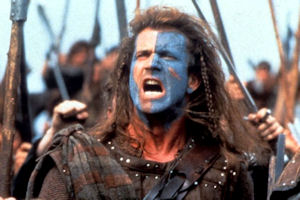
MISSION
War is a deadly business that has virtually zero margin for error. The importance of staying 100% focused on the objectives of the mission cannot be understated. Naturally, under these circumstances, soldiers are forced to be dedicated to the job, and greatness often does come out from within them. This is especially true when disaster occurs in war, such that a comrade has fallen and is trapped in a very dangerous situation. It's the ultimate test for a warrior.
The movie
Black Hawk Down definitely comes to mind. This centers on an American military intervention in Africa that goes wrong when a Black Hawk helicopter crashes. As a result, there is an additional mission objective: save the occupants of the downed helicopter. When you watch the movie, you can't help but see how the soldiers are working together and not letting their guard down at any moment, even as enemy fighters are positioned in so many spots. If you want to watch a solid war movie about dedication to the mission, check out Black Hawk Down.
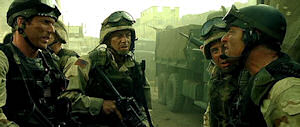
As another example, here is a movie that isn't usually classified as a war movie, but I'm calling it a war movie because it's a drama that is related to the War on Terror. Plus, it centers on intelligence gathering, which is necessary for executing a successful battle. I'm talking, of course, about the 2012 film
Zero Dark Thirty.
Here, Jessica Chastain plays a CIA intelligence analyst whose work ultimately results in the death of Osama bin Laden in the hands of Navy SEAL Team Six. This is a person who will stop at nothing to find the whereabouts of America's most wanted terrorist. While she's not a soldier on a battlefield, she is still someone who is on a mission and carries it out to the end. Her toughness and determination are evident, especially in the face of doubtful intelligence superiors. For that, Zero Dark Thirty is a movie that, to me, shows what one can achieve in war when one is focused on the mission at hand.
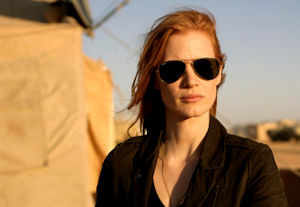
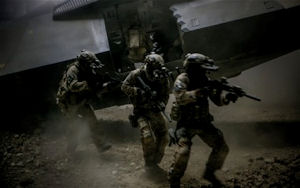
AFTERMATH
What happens when a war finally comes to an end? Naturally, there will be a variety of positive feelings, such as relief that the nightmare is over and joy over the fact that surviving military personnel are coming home. Of course, there will also be negative feelings, including a sense of loss after personal injury or the death of comrades. It all depends on who you talk to once the war is over.
A great example of a war movie about the aftermath of battle is Clint Eastwood's
Flags of Our Fathers. This centers on the American soldiers who raised the flag over Iwo Jima during World War II. They come home to an America that welcomes them with open arms and gives them a grand celebration for their efforts. What's striking, however, is that the soldiers themselves are not really into the festivities as everyone else is. Instead, their minds are on the horrific memories of war, as if they never really left the battlefield.
This is a movie where plenty of things come to mind. One, the horrors of war can never be forgotten, whether immediately after or even decades after. Two, people who see the heroics of soldiers are unlikely to truly understand how war takes a mental and emotional toll. Three, we must always look deep into the psychological state of war veterans to see if they are indeed feeling OK, instead of just praising them because the rest of America continues to enjoy its freedom. You can certainly add to this list if you like. The point is that Flags of Our Fathers is a powerful war movie that has plenty of underlying messages, a testament to its emotional power.
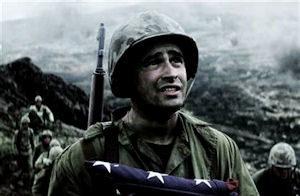
COMPASSION
Given that one should show great compassion for soldiers who fight for us, we should also do the same for soldiers who fight against us. After all, all countries involved in a war go through the same human issues, like the pros and cons of sacrificing combatants' lives and the emotional response of their families once they receive news about their loved ones in war. Really, the only thing that separates opposing sides in a war involves some relatively trivial issue of divisiveness, whether it's related to ideology or limited resources.
Since I already mentioned Flags of Our Fathers, it's worth discussing Clint Eastwood's complementary war film
Letters From Iwo Jima. This one focuses on the Japanese side of the Battle of Iwo Jima. Whereas Flags of Our Fathers presents an aura of celebration mixed with uncomfortable war memories, Letters from Iwo Jima is about despair in the face of a war that appears unlikely to be won. The one scene from this movie I can never forget is the one where several Japanese soldiers in a cave commit suicide by detonating grenades held against their chests. It's a horrific and sad scene, regardless of the fact that the characters represented were deemed enemies to America at one time.
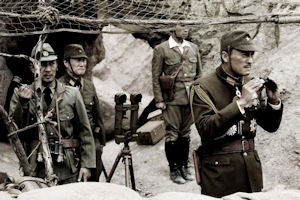
When the movie ended, I was left feeling a great sense of sorrow for the Japanese and what they went through, whether it was Iwo Jima or the bombings of Hiroshima and Nagasaki that obliterated so many people and left many survivors with radiation sickness or cancer. Ultimately, I asked myself what the point of fighting is. Yes, I can understand that some enemies are very dangerous and beyond reasoning with. Putting such cases aside, are there wars that, in retrospect, only generate unnecessary anxiety and animosity and could actually be avoided in the first place? I'm not going further into that since it's beyond the scope of this commentary about war movies. I will, however, share one more example of a war movie with the theme of compassion.
The 2002 film
K-19: The Widowmaker, directed by Kathryn Bigelow (before directing The Hurt Locker and Zero Dark Thirty), is based on the true story of a Soviet submarine that, on its maiden voyage, was on the brink of a nuclear disaster when its coolant system failed. Again, it centers on a group of people who had been one of America's enemies (in this case, the Soviet Union during the Cold War), but the human stories involved recognize no boundaries. Here, Harrison Ford and Liam Neeson play two Soviet submarine officers who desperately find a way to avert the disaster that looms over them.
This was a movie that I had not planned to see, and I only watched it because I had nothing to do and watching this movie was pretty much the only option available. To my surprise, I thoroughly enjoyed it. I found myself gripped by the moments of desperation and suspense. It's a natural human reaction to fear calamities that could happen to oneself or other people. That's what I felt while watching this movie. To anyone who hasn't really looked at the Cold War from the Eastern perspective, check out this movie to get a taste of it. You, too, may find yourself feeling compassionate for a group of people like never before.
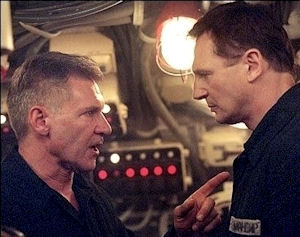
REBUILDING
I shall now conclude my commentary on war movies with one last thought about war. We all know that war is destructive, and when there is destruction, there is a need to rebuild and reconstruct in order to move on from the destruction. It can involve rebuilding structures that were destroyed or rebuilding lives that were shattered. So with that, is there a film that touches on the theme of post-war reconstruction, or at least hints at the idea? There is one I can think of, and it's a great one. So great that it's considered a classic, and it won the Academy Award for Best Picture.
I'm talking, of course, about the 1957 war film
The Bridge on the River Kwai. Now, I know what you're thinking. This is a film about British prisoners of war who are used by the Japanese as slave labor to construct a bridge spanning the River Kwai. I get it. And I recognize the fact that the laborers endured strenuous conditions. But let's put that aside and focus on what gradually happens over the course of the film: the development of a cooperative relationship between the British and the Japanese that virtually puts aside the prisoner-inmate relationship.
What happens is that one of the British prisoners, played by Alec Guinness, makes the honorable vow of having the bridge built to high-quality British standards, rather than sabotage the construction so that the bridge fails on purpose. It is hard to imagine that a prisoner would choose to be that selfless, but one could assume that he's doing it because it raises the standing of the British in the world. Putting that aside, the moments spent building the bridge involve a positive collaborative effort rather than a brutal exploitation of slaves. When the British and Japanese meet to discuss progress of the bridge, there is virtually no sign of a malicious relationship. I've never seen a war drama that plays out like this.
I won't say what happens at the end of the movie. But regardless of how it ultimately ends, the underlying message of building bridges to build peace is wonderfully presented here. This is one of the few movies I know that is first about war but is ultimately about closing the divide between two people. The more I think about it, the more I begin to feel that there should be more war movies that ultimately remind us of the value of human life. I think a movie like that could capture everyone's heart, even the heart of a pacifist.
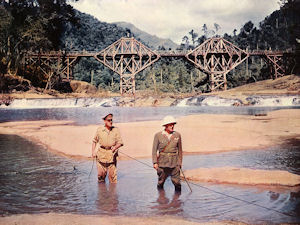
With that, I hope you enjoyed this little journey through the genre of war movies. Thanks for reading. And may the sacrifices of all war veterans be forever remembered.
